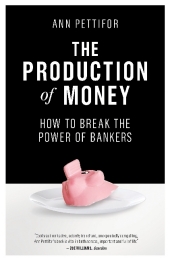 Neuerscheinungen 2018Stand: 2020-02-01 |
Schnellsuche
ISBN/Stichwort/Autor
|
Herderstraße 10
10625 Berlin
Tel.: 030 315 714 16
Fax 030 315 714 14
info@buchspektrum.de |

Ann Pettifor
The Production of Money
How to Break the Power of Bankers
2018. 192 p. 200 x 130 mm
Verlag/Jahr: VERSO 2018
ISBN: 1-78663-135-0 (1786631350)
Neue ISBN: 978-1-78663-135-0 (9781786631350)
Preis und Lieferzeit: Bitte klicken
Geld und Kredit in modernen Gesellschaften geschaffen werden und welche politischen und sozialen Konsequenzen der Finanzmarkt-Kapitalismus für Mensch und Ökosystem hat.
Der Finanzsektor verzerrt und dominiert die Realwirtschaft. Bezahlbare Finanzierungen werden vorenthalten, das Geld stattdessen für Spekulationen und Risikogeschäfte verwendet. Investitionen, die nachhaltig Arbeitsplätze, Löhne und Gewinne schaffen, werden nur noch marginal getätigt, denn: Geld wird mit Geld verdient.
Der Finanzsektor ist außer Kontrolle, es ist dringend geboten, dass Demokratien die Kontrolle über die Geldproduktion zurückgewinnen und den Finanzsektor einhegen. Nur dann wird die Finanzbranche wieder im Sinne der Gesellschaft und des Ökosystems agieren.
What is money, where does it come from, and who controls it?
In this accessible, brilliantly argued book, leading political economist Ann Pettifor explains in straightforward terms history´s most misunderstood invention: the money system. Pettifor argues that democracies can, and indeed must, reclaim control over money production and restrain the out-of-control finance sector so that it serves the interests of society, as well as the needs of the ecosystem.
The Production of Money examines and assesses popular alternative debates on, and innovations in, money, such as "green QE" and "helicopter money." She sets out the possibility of linking the money in our pockets (or on our smartphones) to the improvements we want to see in the world around us.
"Ann Pettifor was always the ideal author of a book that shatters the fantasy of apolitical money and the toxic myth that monetary policy must remain a democracy-free zone. This book is now a reality."
-Yanis Varoufakis, author of And the Weak Suffer What they Must?
"Pettifor has a splendidly clear vision, both of money creation and of the role of banks. There is a great deal to applaud here, including her critique of mainstream economic models, which continue to ignore money and banking or, alternatively, get that horribly wrong."
-Charles Goodhart, Emeritus Professor, London School of Economics
"Pettifor´s new book aims to elucidate the nature of money, the better to help women advocate for their needs."
-Maya Singer, Vogue
"Ann deserves a lot of credit because she was trying to highlight these issues many, many years ago, and unfortunately, there weren´t enough people who were trying to map the system, model it, and then above all else, modify it. We have to map the financial system and then work out how to change it."
-Gillian Tett, author of The Silo Effect
"Our livelihoods and ecosystem are deeply affected by the world of money production and finance. But it´s a world largely hidden from us by vested interests. In language we can all understand, Ann Pettifor explains the issues and the debates around money, shadow banking, QE and ´helicopter money.´ A must-read."
-Caroline Lucas, Co-Leader of The Green Party of England and Wales
"Coolly authoritative, soberly trenchant, unexpectedly compelling, Ann Pettifor´s book is vital in both senses, important and full of life."
-Zoe Williams, Guardian
Ann Pettifor is the Director of Prime (Policy Research in Macroeconomics), an Honorary Research Fellow at City University, and a Fellow of the New Economics Foundation. She has an honorary doctorate from Newcastle University.
She is known for her leadership of the Jubilee 2000 campaign, which resulted in massive debt cancellation for more than thirty countries. She has served on the board of the UN Development Report and in 2015 was invited onto the economic advisory board of the British Labour Party by Jeremy Corbyn. She is the author of The Real World Economic Outlook and The Coming First World Debt Crisis and co-author of The Green New Deal and The Economic Consequences of Mr Osborne.


